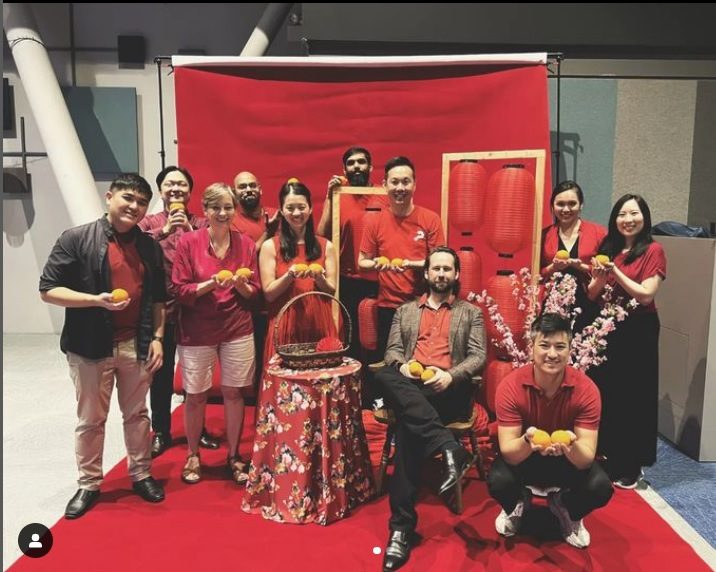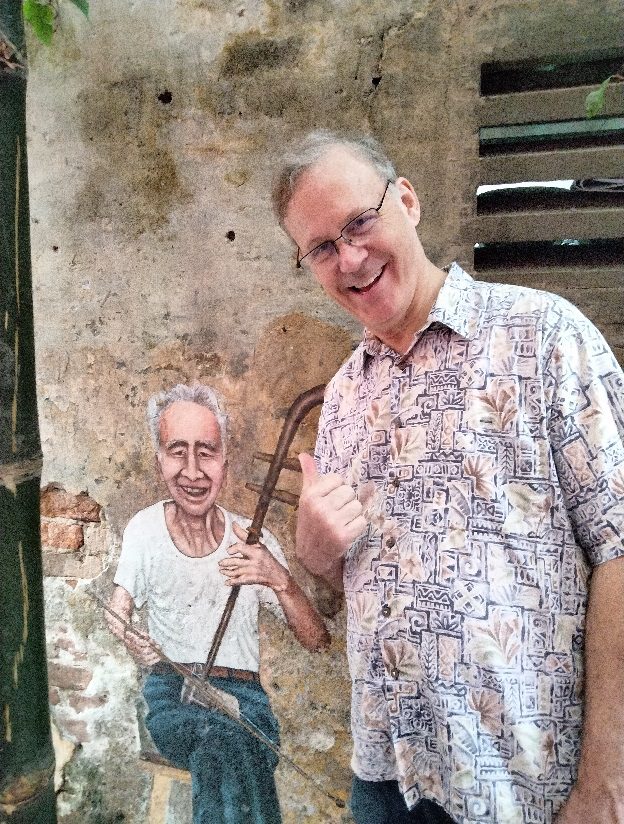|
[Photo: The St. Paul’s Theological College Faculty and Staff recognize the Chinese New Year with oranges, a symbol of well-being and abundance.]
Then Jesus said to him, ‘What do you want me to do for you?’ The blind man said to him, ‘My teacher, let me see again.’ Jesus said to him, ‘Go; your faith has made you well.’ Immediately he regained his sight and followed him on the way. Mark 10:51-52 Dear Friends, We hope you all enjoyed a Happy Lunar New Year. We have been in Malaysia now a little over a month, and we just finished the observance of Chinese New Year for the two weeks before and after January 22nd. The CNY celebration in your area might have been more muted, but here, it was quite festive. We ate well and saw lots of art, splashes of red everywhere, and lots of bunnies as we enter the Year of the Rabbit. In the brief story of the blind beggar, Bartimaeus, in Mark 10, Jesus asks the blind man an interesting question: “What do you want me to do for you?” Why, at one level, would Jesus need even to ask? You wouldn’t need divine omniscience to know that the blind' man’s top request would be to be healed. But Jesus still wanted the blind man to ask. Another way to put it is that Jesus doesn’t assume he knows—he let’s the blind man express it first. I (Rich) call this question “The Servant’s Question”, because Jesus asks this question twice in the larger context of Mark 10, before and then after Jesus teaches his disciples about seeking to be great by becoming a servant. Jesus, and Mark in his composition of his gospel, is teaching us that asking this simple question is a powerful way to be a servant. Jesus, with divine resources and knowledge at his fingertips, nevertheless asks people to express what it is they would like from him. Now, I do not think of myself as Jesus, but I do want to learn from and model my ministry after his. I am doing a great deal of teaching, which I am very grateful for. Every week I teach between 20 and 24 hours of classes, some for the three seminaries in Malaysia we serve and a training center in China, and the rest of the time in non-formal classes, each with 6-15 men and women who are serving as pastors and lay leaders among the poor in several states of India. Some of the classes are taught in English, but about half of those hours are taught in translation. All the classes are inductive, which means (especially for the translated classes) I do a lot of listening. I listen when my own words are translated, but also when Scripture is read (in Hindi, Tamil, Oriya, etc.), when people are making their comments in the group sessions, and I listen some more when their comments are being translated to English so I can understand. So my classes are not “efficient”—I spend 90 minutes but only perhaps actually “teach” for 20. Of course I don’t really believe my classes are inefficient, because even when I am not teaching, I am modeling: asking questions, seeking participation, affirming contributions, clarifying and summarizing what others have said, asking follow-up questions; and from time to time I am also bringing out the clarity that may be lacking in the discussion after we have had significant time discussing the text. And then at the end of the non-formal classes, I usually try to complete my remarks a little early so there are 10 minutes to listen to and jot down prayer requests and pray. I have come to see that asking, “What is it you would like me to pray for for you?” is an important way I can serve the people I am teaching and training. I hear prayer requests about upcoming weddings, sick family members, heartaches (tonight I prayed for a bride for a young and poor pastor), home and church construction projects, children’s college and high school exams, and everything in between. I get to know their lives and needs. I do not have money to resolve all the financial pressures, but we together have access to the Father from whom all good gifts come to us. I would never have said I am a man of prayer. (I would own to be fairly described as a man of Scripture.) But I am praying more, for more people who are desperate, and more eager to hear of answered prayer, than I have ever been. And I am glad to be more willing to ask the servant intercessor’s question: “What is it you would like for me to pray for you?” I am so grateful for the way God through this ministry is changing me. Prayer Requests
Perhaps you saw our notice in our last letter, but Lisa’s book, Resonate, How to Preach for Deep Connection, came into print mid-December. If you haven’t had a chance, check it out here and consider buying a copy for yourself or as a gift for a pastor, campus minister, or seminarian friend. We would greatly appreciate if you would rate and review it on Amazon. It’s quicker than you’d think—don’t feel a need to compose an essay. Two sentences would be great. We’re so grateful to you all for your prayers and care! With gratitude for your friendship, financial partnership in our work, and prayers, Rich and Lisa Lamb PS: Below see images of colorful and artistic displays in our neighborhood during the Lunar New Year observances.
0 Comments
|
Archives
April 2024
AuthorRich and Lisa Lamb Categories |



 RSS Feed
RSS Feed